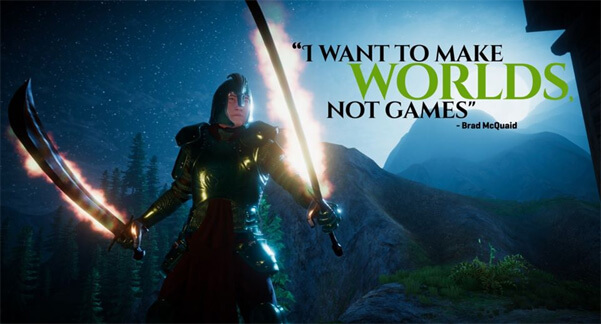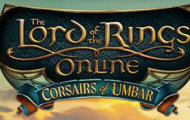The recent passing of EverQuest co-founder and MMORPG visionary Brad McQuaid has caused me to pause and take stock of the fantasy virtual world genre that was born 20 years ago with the release of EverQuest.
EverQuest’s magic was that it offered a person the closest thing to total escapism available at the time. Unlike the isometric top down world of Ultima Online, EverQuest transported you into an immersive 3D first person fantasy world. You could leave your real-life cares and persona behind and role-play an archetypal fantasy class of your choice as a human, an elf, a dwarf, an ogre and more. Even better, you did this in communion with people from all around the world who became your friends.
Norrath felt like a real world because it persisted no matter if you were logged on or not.
The recent Steven Spielberg film Ready Player One gives normies a small glimpse into the experience of being totally immersed in a virtual world.
After long bouts of reflection, one question keeps coming up:
Why did fantasy virtual worlds fail to live up to their potential?
During those initial years of MMORPGs, we all thought we were on the cusp of a revolution in interactive and participatory entertainment. Designers frequently told us that the Holy Grail of MMORPGS was a living and breathing world. Blogs sprung up overnight. Excitement was in the air! Most of us thought that someday that promise would be realized.
Stuck in Groundhog Day
It’s been 20 years since the release of EQ and 15 years since the release of World of Warcraft and almost nothing has progressed. We are still no closer to realizing that dream of a living breathing world that was promised to us by science fiction writers like Michael Crichton in Westworld or the Holodeck from Star Trek: The Next Generation.
Sadly, the dream of visiting in a true living and breathing virtual world never materialized. Somehow that dream, that quest, that ambition, that destiny was put on the backburner and forgotten. As nature abhors a vacuum, the game aspect of MMORPGs took over and filled that void. The min-maxing, number crunching, theorycrafting achievers of Bartle’s Players Who Suit MUDS became the dominant player type and the devs — themselves uber achievers — were only too happy to cater to them.
As the socializers and the role-players were cast aside and ignored, the player base became a self-fulfilling monoculture of achievers.
Another troubling trend happened as solo gameplay became the dominant playstyle. The community aspect of MMORPGs suffered greatly because of this.
How Did We Get to this Point of Indifference and Apathy?
The story of fantasy virtual worlds will always include Blizzard’s World of Warcraft.
Blizzard never cared about the long-term potential of virtual worlds, they only cared about making more profits via growth. Growth means dumbing down gameplay so that Jeff Kaplan’s mother (she actually played WoW) and toddlers could also play.
Years ago, former WoW dev Greg Street said as much on on Twitter:
Different approaches work for different products, and I don’t want to second guess the WoW team. Let’s just say that after working on Age of Empires and World of Warcraft for a total of 16 years, it’s really refreshing to work on a game where I don’t have to worry whether someone’s grandmother can pick it up or not.
Over the years, there have been thousands upon thousands of video games released that give players the “game” experience with brief interludes of escapism and fun. Over that same time period, there have been precious few virtual worlds that come remotely close to providing living and breathing virtual worlds for the player to spend extended periods of time in.
What if?
What we see in most fantasy MMORPGs are only illusions of a virtual world complete with Hollywood false front sets. There is just enough “life” abounding to fool players into suspending their disbelief. While this is a useful and necessary sleight of hand in video game world-building, it is still a facade nonetheless.
What if a player could actually experience an authentic working, living and breathing virtual world with virtual ecology, forces of nature, forces of the supernatural, interpersonal and interspecies dynamics, virtual economies with the laws of cause and effect that exist in the real world?
What if every time you entered the same valley, town or city, things were slightly different with new festivals, new plagues, new political drama, new rulers and new conflicts?
Who would not chomp at the bit to be a part of that kind of fantasy virtual world?
All these long years later, we’re still at square one. Nothing of this magnitude has even been attempted. This is because nobody has cared enough or had the resources to make it happen.
The World of Warcraft Narrative Formula
Instead of trying to strive for living and breathing virtual worlds, those in charge with the lion’s share of the MMO resources got fat, stupid and lazy. They took the path of least resistance and seduced us with heavily scripted narratives released in an episodic manner.
Each expansion in your typical fantasy MMO goes like this:
An undiscovered continent rises mysteriously from the mist. With it comes new NPCs to meet, new monsters to slay and shiny loot to be gotten. The uber villain of every expansion is eventually vanquished one patch before the next expansion is to be released. There is no deviation from the timeline and the formula™. No matter what you do as a player NOTHING EVER CHANGES.
My Living and Breathing Virtual World Wish List
So here goes. Here’s my combined list of unresolved problems and wishes:
- NPCs are still primitive automatons with no substantive A.I. and still only deliver quests and buy/sell items like PEZ candy dispensers
- NPCs exist to solely to act as loot/exp pinatas to please players and have no purpose beyond that and never self-actualize
- NPC respawn mechanics are still the same as they were 20 years ago with a primitive Groundhog Day repawn cycle anywhere from 3 minutes to 24 minutes
- There is no actual virtual ecology and climate that functions and reacts to external forces both NPC and PC
- Despite the meteoric impact of Minecraft on gaming culture, players can still not create, build and change anything in a virtual world
- The natural environment and humanoid structures never age and are indestructible by NPCs and PCs
- Interaction with the environment is limited and almost non-existent
- NPCs do not interact with other NPCS in any meaningful way. In many MMOs the wolves still exist side by side with the lambs.
- There is no hunting, gathering, agriculture or industry that truly impacts the virtual world or player
- There is no virtual economy where the invisible hand of dynamics of supply/demand and abundance/scarcity is at play affecting both players and NPCs
- There are no plagues, famines, disease, uprisings, revolts, revolutions among the populace both NPC and PC
- There is no appreciable difference between day and night. The SWTOR MMO didn’t even bother to put in a night cycle
- Seasons still do not exist in any major fantasy virtual world or MMORPG
- Live GM events and quests have been phased out of MMOs entirely
- Players still can’t get married to NPCs and or PCs and have NPC children in a fantasy virtual world
- NPCs still can’t fall in love with players and vice versa
- Simple relationships with NPCs are still impossible
- Faction and reputation systems are still crude and primitive
- Players still have no way to permanently affect and shape the destiny of the virtual world that they inhabit
- Players have no sense of ownership or actual ownership
- Players have no way of permanently impacting the world around them
Instead what do we get for waiting for 20 years?
We get “content” such as cinematics — lots of them! Better armor, better weapons, better abilities, better animation, more monsters and more zones! Sprinkle in a few new gimmicks for the marketing team. Yippee!
It’s like major MMO studios have been creatively asleep for 20 years. Same crap, different day.
It would be unrealistic to expect every one of my wishes to be granted but we are not an inch closer to realizing most of them. Progress towards this dream is negligible at best.
Putting MMORPG Developers on Trial
The biggest problem we have in realizing the goal of a living breathing world is that due to the heavy cost of production, there are only a few MMO studios in existence. Consequently, there are only a handful of MMO devs who have the authority and power to create fantasy virtual worlds. This leads us to an ever shrinking pool of people who even care about propelling the virtual world to actualization of its potential.
What have the following virtual world devs done to help bring the dream of a living and breathing virtual world closer?
Chris Metzen, Alex Afrasiabi, Jeff Kaplan, Ion Hazzikostas, Tom Chilton, Jeff Pardo, Scott Hartsman, Holly Longdale, John Smedley, and Raph Koster just to name a few.
Have any of these top devs ever spoken out passionately about fantasy virtual worlds fulfilling their potential?
Have any of them every bothered to use their positions of leadership to inspire future generations to carry the torch?
Instead, we hear the same canned focus group tested, ready for media snippets and speeches delivered year after year.
To much is given, much is expected. Much has been given to a select group of MMO and virtual world luminaries over the years.
Some of the above developers have advanced virtual worlds via their actions and words. Some have done either and some have done neither.
Blizzard: The Deadbeat Dad of the MMORPG Industry
MMO studios would often cite the lack of technology as an excuse for why they haven’t appreciably advanced their virtual world. With today’s processing power, that excuse is no longer valid.
Companies like Blizzard Entertainment has made billions of dollars from WoW. Over the years, they’ve had plenty of time and resources to do virtual world research and development.
Instead, Blizzard have been putting their time into exploring ways to monetize their products and promoting the diversity/inclusion agenda.
Yes, Blizzard failed big-time with Project Titan, but that is no excuse for abandoning the creation of more virtual worlds. Apple and Steve Jobs failed many times but they kept going. Many famous Hollywood directors have had films that bombed at the box office, but that did not deter them from making more films that were successful.
Blizzard has completely abdicated their responsibility to advance the genre.
At the very least they should have released a MMORPG construction set complete with assets and world building tools that could be used by indie developers to flesh out new ideas and bring the dream of a living virtual world to fruition. They could have charged them a royalty to help them defray the cost like Unreal and Unity do with their software development frameworks. Blizzard owes it to the genre to make this available.
World vs. Game
I deliberately avoided the term “MMORPG” in the title of this article and used “fantasy virtual world” instead. Why?
Because language matters.
Do you ever notice how many MMORPG devs still talk about “the game?” Evern World of Warcraft developers use this terminology and “world” is in the title of their MMO.
There is hope. Even Ion Hazzikostas at Blizzard now understands that the world itself is the prime force and prime character of a MMORPG.
One thing that Brad McQuaid got right was that he believed that the world mattered more than the game. Making a world is a higher calling then making a video game. J.R.R. Tolkien understood this as well when he talked about the process of sub-creation.

MMORPG devs need to stop talking about making games and start talking about making worlds. This terminology change alone could make a huge impact in pushing this genre to greatness.
Final Thoughts
So here we 20 years later in 2019. And precious little has changed. Most of the old MMO blogs that I used to follow have shut down. Terra Nova a website run by academics devoted to virtual worlds is long gone. The hype about virtual worlds evaporated a decade ago.
The MMORPG genre is in a state of arrested development. The same old formula is tired and played out — just like the washed up devs who are responsible for it all.
Just when you think someone gets it like Intrepid Studios with their ambitious Ashes of Creation, they disappoint and do a bait and switch scheme and make a battle royale game.
Risk averse investors only want to chase trends and will only invest in the fad of the day video games like Fortnite. Hollywood does the same with their never ending series of predictable superhero films and reboots.
We need to find a billionaire sugar daddy like Jeff Bezos or someone like Markus “Notch” Persson of Minecraft fame to bankroll a fantasy virtual world and give it the resources that it deserves.
I hope Brad’s passing will have some positive effect on the virtual world industry. Those involved, should stop to pause, reflect on his contributions and his dreams for what MMOs could be and how they can help make it happen. All have you have been cashing in on this genre for years, perhap it’s time to give something back.
MMOs and virtual worlds are the one of the most unique forms of participatory entertainment the world has ever seen and still in their infancy. This is something to be very grateful for and proud of.
The people who inhabit these virtual worlds are extremely loyal, passionate and patriotic evangelists for the genre. As Brad used to opine, these fans have been orphaned and have no virtual world that they can call home. There has to be some way of harnessing their unswerving loyalty beyond crowdfunding. Stop shutting them out, let them in!
Now that Brad McQuaid — who was the lone voice in the MMORPG world advocating for worlds instead of mere games — is gone. Who will pick up his torch? Who will continue on his legacy? Who will keep the dream alive?
The dream never dies, just the dreamer.
-Wolfshead





10/10
I’ve spent years jumping from MMO to MMO searching for that living, breathing world. What I found was little more than disappointment. At this point, I’ve given up. I very much hope that Pantheon becomes the experience that we are all hoping for. But I have to be honest; I’m not holding my breath.
This is a beautiful and thoughtful article. Thank you.
Completely agree with this article. <3 I have VERY HIGH hopes for Chronicles of Elyria which will be a world that has quite a few of the things most MMORPGS are missing, that is IF they pull through with their promises. You should look into it as I'd love them to have the backing they need, which honestly they have lots of backing already. They plan on the game dieing, afterall a true world would eventually die when animals are poached constantly and trees are cut down without a plan ect ect. The game has a 10 year life plan, and Definitely think if not worthy of a review from you, with its current state of the game it's definitely at least worthy of you looking into the game itself
Thanks I’ll take a look! 🙂
I saved this page. I it still sucks how things turned. Thx for making it
Wurm Online had a lot of those requests, pretty old though.
It’s just not accurate to say that Brad was the lone voice advocating for worlds, not games. LOTS of MMO devs have done so, and continue to do so. I’m sure the crew working on Pantheon, for one, will carry on with his ideals in mind.
One of the quotes of mine most often seen online is “It’s a SERVICE. Not a game. It’s a WORLD. Not a game. It’s a COMMUNITY. Not a game. Anyone who says, “it’s just a game” is missing the point.” That’s from like 1997.
Or there’s this, from 12 years ago: https://www.raphkoster.com/2006/02/24/what-are-the-lessons-of-mmorpgs-today/ — might be worth comparing it to your wish list!
For that matter, you might want to compare what we tried to do in UO and SWG to your wish list.
In any case, the name of my new studio might be a hint as to what we are trying to do this time. 🙂
Hi Raph, thanks for stopping by!
Of course there are MMO devs that care about virtual worlds. They have not gotten much publicity in the past 10 years. Maybe they’ve gone underground and are silent. I think the passion of devs has abated in the last 10 years. I rarely if ever see a rally the troops speech for virtual worlds.
Your article on WoW’s anniversary a few years ago was brilliant but a reality check. I recall one current indie MMO dev complain that WoW sucked all the oxygen (and money) out of the room and didn’t leave much for any other ideas.
Richard Bartle once said that the best thing that could happen to the MMO genre was if WoW was gone or something to that effect. I think he was right. The all or nothing/winner take all public adoption of MMOs has been ultimately destructive and injurious to the possibility of new MMOs and new ideas coming forward.
Having the entire MMO industry located in expensive southern California doesn’t help either.
Raph, your contributions to the virtual worlds genre speak for themselves. Star Wars Galaxies was a monumental achievement in the realm of sandbox virtual worlds. I was remiss in not including you but my intent was to keep the article focused on fantasy virtual worlds. Ultima Online is certainly a genre defining classic that deserves recognition, without it there would be no EverQuest. The history of MMORPGs is one of giants standing on the shoulders of other giants. 🙂
Perhaps the best book ever written on game design is your A Theory of Fun. It’s a masterpiece. I used the ideas in that book to help land my job as a video game designer. Sorry for all the accolades, but they are well deserved.
I will read that article again. Thanks for the tip. I’ve always been a huge fan of your writings and ideas.
Years ago there was something called the Bartle Test. I took that test and found that my score put myself in the same category as yourself. That was one of the things that gave me confidence to start writing about game design and to apply for a job as a level builder.
Your quote about service, community and words now just as relevant as when you made it. The term “game” is so limiting and I wish devs in the MMO space would stop using it. We are creating experiences for people and places for them to have experiences with other fellow travellers.
Year ago when I went to music college, one of my professors was Tom Lodge. He ran one of the pirate radio stations that used to operate in the waters around the UK out of the reach of the authorities. At the time the BBC had a stranglehold on what people would listen to on the radio. He was a very interesting and mercurial fellow. He taught me to look beyond the surface perception and think about things differently.
He used the example of McDonalds. They don’t really sell hamburgers, they are selling people an “experience.” The experience of going to McD’s as a kid was just that, full of bright colors, happy smiles and a playground. Escapism! The food is really incidental.
To me, the community that one experiences while being in a virtual world is a happy by-product of the game mechanics, the artwork and the shared adversity. This is what too many MMO devs have forgotten over the years as they are too busy with DPS calculations, metrics, demographics and spreadsheets.
Strangely enough, I was curious about your new company Playable Worlds a few weeks ago. I thought to myself: “What could Raph be up to?” and lo and behold here you are.
Here’s an interview Raph gave to Gamasutra this past October. Raph’s got the virtual world bug again!
https://gamasutra.com/view/news/352451/Welcome_Back_Koster_Why_an_MMORPG_vet_is_back_building_a_new_virtual_world.php
https://www.playableworlds.com/
I know whatever you do it will be ground-breaking and I hope very successful. Thanks again for stopping by. I’d be happy to learn more about what you are doing!
Eloquently stated…my thoughts in your words.
A bit harsh Wolf but a good read. Personally I have given up on MMORPG’s after the raping of Everquest Next by Deybreak Games. That was the final straw for me. I strictly play Single Player and avoid the pain now.
Moreover, I have no faith in the obvious scam Ashes of C_
or Elyria or Pantheon..just don’t trust anyone at this point.
Yes, it was harsh but I feel that the people at the top of the MMORPG genre need to be held accountable in some way.
The EQ Next fiasco is a black mark on the genre. SOE/Daybreak handled it poorly and disrespected all of the people that invested money into the scheme.
The biggest problem right now in the MMO industry — what’s left of it — is hubris and insularity. EQ devs — not all — are some of the most arrogant bastards I’ve ever seen. I’ve dealt with one ex-EQ dev in particular, and this guy believe’s he’s God’s gift to MMO design. The fans are always left out of the process and ultimately it ends up hurting the MMO.
I’ve compared the video games industry to the music business in the past and I believe that comparison is apt.
“The music business is a cruel and shallow money trench, a long plastic hallway where thieves and pimps run free, and good men die like dogs. There’s also a negative side.”
― Hunter S. Thompson
I think at this point the SOE/Daybreak/Darkpaw has lost all credibility. Because of that my attitude is “show me, don’t tell me.”
Make EQ3. Just do it. Stop trying to fit the fad of the day (Minecraft, Fortnite) into the MMO.